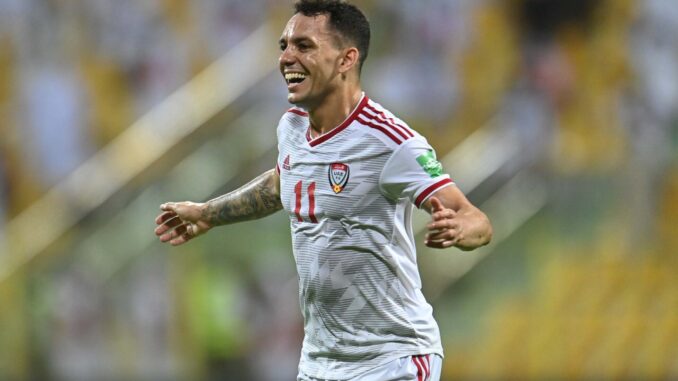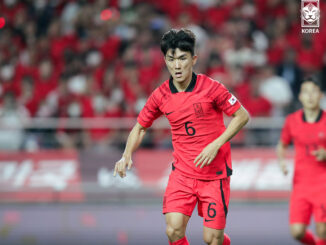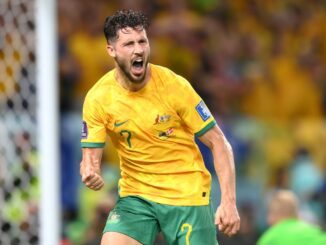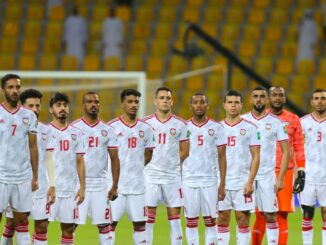
One win for the United Arab Emirates over the next week will likely guarantee their Road to Qatar 2022 journey continues to the final AFC playoff in June.
The question to ask then is, why is the mood so quiet out in Abu Dhabi?
Qualification to their first World Cup in over 30 years would, probably should, optimise the feeling around Emirati football of late. It’ll be ironic, that amid a desperate sense of mediocrity, treading water and disappointment, that their primary modern-day pursuit of qualifying for the global showpiece may materialise under such a cloud.
The dream remains realistic, victory over Iraq on Thursday, now being played in neutral Riyadh thanks to a controversial about turn from FIFA, will all but see them guarantee their spot in the Fourth Round playoff.
Their opponents, if going off percentages will be an out of sorts Australia, or if the Socceroos produce a miracle fortnight, potentially Japan or Saudi Arabia. Then onto, the South American qualifier, currently Peru.
However, the lack of optimism around the national team stops assertions in their place.
With a potentially memorable three months ahead of them, Emirati national football is instead focusing on a new phase of transition. Bert van Marwijk, brought back for a second spell as head coach this time last year, has been relieved of his duties once more despite on paper, doing as much as anyone could’ve hoped for.
In his place, Argentine Rodolfo Arruabarrena has been thrust into the hot seat, the seventh man to hold the position over the last five years.
Five years in football is a long time, but in many ways, it feels like yesterday when Mahdi Ali was ultimately hounded out of a job he grew to define.
Over his own five-year tenure, he formed the so-called ‘Golden Generation’, pushed the national team to the semi-finals of the Asian Cup and within touching distance of World Cup qualification; while a heady achievement at the time, it was something ultimately seen by some as an underachievement.
What has followed could be perceived as erratic, reactive shifts in policy making; in repeated attempts to install a well-known figure head, from Argentine Edgardo Bauza, fresh off WCQ failure in his homeland, through the ever-declining Italian Alberto Zaccheroni, to one-time wonder Colombian Jorge Luis Pinto.
Over this period, only Bert van Marwijk succeeded in parts; unsurprising given his knack for gluing together odds and ends to provide adequate results. While in most cases it’s been broadly effective, pretty it hasn’t been.
UAE have been broadly pedestrian for nine months now, passive in play and depending which side of the fence you sit on, either doing the bare minimum to cling on, or riding a tide of fortune.
For a side chasing third (out of a group of six), a modest record that has only seen them win two from eight matches so far, indicates how far the chasing pack are behind the already qualified top two of Iran and South Korea.
The fact that Thursday’s opponents Iraq can still qualify for Qatar with two matches to play, having not won a single game so far says it all.
In a way this is what van Marwijk was brought in to do; to get UAE in a good position to qualify in what has been a changeable time. While Mahdi Ali oversaw the Emirati Golden Generation, the following five years has featured a hashed-out cohort of players that very rarely seem to fit with a distinct identity or focus.
The outgoing greats, the likes of Omar Abdulrahman and Ahmed Khalil have long been off the boil, yet there are remnants from the recent past in the lingering presence of defensive dinosaurs Mohanad Salem, Walid Abbas and Mahmood Khamis.
This is off-set by the new generation set to properly progress on the Road to USA/Canada/Mexico, four years too early to really stake a claim this time around; but the likes of Yahya Al-Ghassani and Mohammed Al-Attas have offered glimpses of their potential.
And then, the sticky tape to bind the project together, the nationalised contingent, who in the main have added to the overall quality, if not the cohesive nature; led by the recently forlorn looking Caio Canedo, and last roll of the dice, but still useful from the bench 37-year-old Sebastian Tagliabue.
Whether any coach could gel this vast array of independent components together is a question on its own. Arruabarrena has two matches to make it over the line before the swift, steep climb of World Cup playoffs begins in earnest.
By that point, however, the thrust behind this squad may return with some clarity, the same impetus that got them to this stage back in June, when van Marwijk returned to save what had previously been a miserable Second Round campaign.
The June round-robin, helpfully at home, against their Southeast Asian group counterparts, stands out as the peak of van Marwijk and UAE’s powers this cycle.
Four matches, four wins. 12 days, 15 goals scored. It was a productive and effective fortnight, which had many hailing (including ourselves) van Marwijk’s impactful return and the newly established overseas player nationalisation process as the keys to unlock UAE’s untapped potential. In parts, we were right.
Fabio Lima, the Al-Wasl star, who’s domestic form arguably tipped the UAEFA towards the short-term handout of Emirati passports, was immense over this period.
Five goals over those two weeks, his contribution on the scoresheet was only one part of his significant impact on how the team set about the game. His pace, direction and nous to offload in the right positions, took UAE from a team that could only build up methodically, to one that could hurt anyone on the counter.
It’s no surprise that UAE have struggled to replicate such regular direction and guile since, with the striker picking up multiple injuries that have kept him out since November.
The other key loss has been Ali Mabkhout, a man that keeps pace with Lionel Messi at international level is always going to be a significant omission.
His goals again are only part of his influence, however unlike Lima perhaps, Mabkhout has been able to keep scoring even when his all-round game has gone missing. In a time where UAE have looked to grind out more games than they have ran away with, his injury in January was a crushing blow to their confidence.
A mix of generational change, a revolving door to the dugout and injuries to key attacking players haven’t helped matters, but the overwhelming factor that dictates the mood of late, is that of realism.
UAE remain a team considerably off the pace. Whereas previous missed opportunities were put down to lack of experience, misfortune or simply just better opposition, the fact they are now gifted an opportunity at success, their lack of quality in the playing staff is becoming more apparent.
December’s 5-0 humbling defeat to Qatar in the Arab Cup, with all goals coming in the first half, was arguably the final nail in the Emirati football coffin. This came quickly after another disappointing year in continental club football.
UAE Pro League clubs have only recorded one quarter-final Champions League appearance in the last four years, a far cry from two final and one semi-final appearances in the previous four.
The youth game is slowly improving its quality, with high hopes ahead of this summer’s U23 Asian Cup to feed the next World Cup cycle, however there remains a clear distinction between domestic football played in UAE, compared to neighbouring Saudi Arabia or Qatar, let alone East Asia.
In many ways, the capitulation at national team level was expected. What feels like a dragged out global showing of their World Cup qualification campaign seems to hurt more than it offers hope.
With Iraq in their sights come Thursday, the stars remain aligned, however. For better or worse, UAE look destined for a return to the World Cup playoffs. Can Arruabarrena engineer this opportunity into something much more?
Photo: UAEFA




